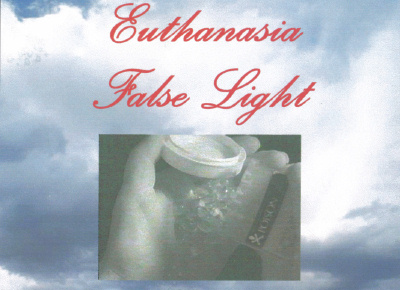2017 Summary of Drugs Used for Doctor-Prescribed Suicide
“Medical Aid in Dying: A Comprehensive Breakdown”
(Discover Magazine — November 19, 2021)
Dr. David Grube, an Oregon physician who has participated in many assisted suicide deaths, describes the drugs and process.
The law allows family members to hold the cup containing the deadly drugs, but the patient must be able to swallow it on their own. If a patient uses a feeding tube, they must be able to push the plunger on the syringe containing the drug cocktail. Similarly, patients who use a gravity feed bag must be able to open the valve or clamp on their own.
“AMA Helps Normalize Organ Harvesting after Euthanasia”
Additional information and articles:
Many individuals believe that doctor-prescribed suicide (referred to by proponents as “death with dignity” or “aid-in-dying”) occurs after a person takes “a pill.” Nothing could be farther from the truth. In reality, the dosage of drugs for doctor-prescribed suicide is a huge quantity of barbiturates (sedatives).
A pill bottle filled with drugs is the reality.
Source of photo
“‘This substance will cause death’: New euthanasia rules announced”
(Source: The Canberra Times — September 26, 2018)
Euthanasia drugs will also have to be kept i a steel box with a label affixed warning “this substance will cause death.”
…It is understood work is under way that would allow the state government to import lethal medications used elsewhere in the world. They could include pentobarbital (better know as Nembutal) and another barbiturate sedative known as secobarbital, which are banned for human use in Australia.
More on Australia
“Will assisted suicide always provide a quick and gentle death?”
(BioEdge — October 7, 2017)
The pervasive belief that these, or any, noxious drugs are guaranteed to provide for a peaceful and painless death must be dispelled; modern medicine cannot yet achieve this. Certainly some, if not most, executions and suicides have been complication-free, but this notion has allowed much of the general public to write them off as humane, and turn a blind eye to any potential problems. Executions or PAS have never been as clean as they appear, even with the US’s medicalization efforts during the 1980s.
“Navigating the new era of assisted suicide and execution drugs”
(Journal of Law and the Biosciences –August 2017)
Lethal medication provisions are in a precarious state. Over the past decade, pharmaceutical companies have attempted to stamp out the use of their drugs in executions, creating several economic and regulatory hurdles for access to these medications. As a result, patients seeking physician-assisted suicide (PAS) as well as death penalty states aiming to execute their capital offenders have been forced to turn to unregulated and dangerous alternatives for these drugs.
“Accessing Drugs for Medical Aid-in-Dying”
(The Scientist — August 17, 2017)
A lethal dose can be covered by Medicaid in California or by one of multiple private insurance companies in Oregon and California…
David Grube, national medical director for Compassion and Choices [the former Hemlock Society] believes the drugs “should be covered by all insurances.”
Last year, physicians in Washington suggested a slow-acting combination of drugs but at least two people died more than a day after taking the lethal dose.
[Note: This length of time was not reflected in the official Washington report for 2016 but may have been included in the “unknown” category.]
“Docs in Northwest tweak aid-in-dying drugs to prevent prolonged deaths.”
(USA Today — February 16, 2017)
The first Seconal alternative turned out to be too harsh, burning patients’ mouths and throats, causing some to scream in pain….In Oregon, even with fast-acting barbiturates, time to death has ranged from one minute to 104 hours.
More on Washington
More on Oregon
Only woman on Georgia’s death row is executed
Kelly Renee Gissendaner was pronounced dead by lethal injection of pentobarbital Wednesday, September 30, 2015 at 12:21 a.m. at the state prison in Jackson, Georgia.
[Note: Pentobarbital is one of the drugs used for doctor-prescribed suicide.]
Articles
“My aunt’s struggle with assisted suicide: There was death, but not enough dignity”
(Los Angeles Times — August 14, 2016)
The full “cocktail” included two anti-nausea pills, an anti-seizure pill and 100 capsules of Secobarbital….We had been forced to assist in the most bizarre fashion….finally emptying capsules, making an elixir so vile I cried when I knew she had to drink it. This was death with dignity?
“Drugs for physician-assisted death”
(Source: Toronto Metro — June 12, 2015)
Complicating the issue is the fact that oral drugs that would be taken by eligible individuals seeking to end their lives on their own are not readily available in Canada, so doctors willing to help a patient die must administer the lethal medications.
More on Canada
Note: Canada permits both doctor-prescribed suicide and doctor-administered lethal injection.
“Zurich doctor fined for not reporting assisted suicide”
(Swiss Info — April 11, 2016)
Swiss law tolerates assisted suicide when patients commit the act themselves and helpers have no vested interest in their death….Death is usually induced through a lethal dose of barbiturates that has been prescribed by a doctor. Ingestion of the poison, whether by drinking it or through the use of intravenous drips or stomach tubes must be carried out by the person wanting to die.
More on Switzerland
“Death with Dignity doctors thwart drugmaker’s price hike with new medication”
(Seattle Times — April 2, 2016)
They’ve come up with a new mix of medications that induces death….They’ve opted for it even though the new medication tastes worse, burns the mouth and may take longer to work than Seconal.
“Pharmaceutical Companies Hiked Price on Aid in Dying Drugs”
(KQED — March 22, 2016)
When California’s aid-in-dying law takes effect this June, terminally ill patients who decide to end their lives could be faced with a hefty bill for the lethal medication.
Valeant Pharmaceuticals, the company that makes the drug most commonly used in physician-assisted suicide, doubled the drug’s price last year, one month after California lawmakers proposed legalizing the practice.
More on California
“Californians Can Choose to Die — With the Help of Taxpayers”
(U.S. News & World Report — March 22, 2016)
California’s aid-in-dying law contains a provision allowing doctors and hospitals to opt out of helping terminally ill patients access medications that would help them hasten their deaths, but that same exemption will not be carved out for state taxpayers.
The state government plans to assist in the cost of providing life-ending medications and doctor visits using $2.5 million already quietly tucked into Democratic Gov. Jerry Brown’s proposed budget in January.
More on California
“Drug Used in ‘Death with Dignity’ Is the Same Used in Executions”
(US News & World Report — October 16, 2015)
Just before he died, Michael Lee Wilson said he could feel his whole body burning as the drug meant to kill him coursed through his veins….But a conflicting little known reality is that the same drug they often criticize — pentobarbital — is the same one the so-called Death with Dignity movement is trying desperately to access so terminally ill patients can hasten their deaths in what they have characterized as a peaceful and dignified experience.
“Assisted Suicide and Lethal Injection: FDA’s Regulatory Dilemma?”
(Harvard Law Petrie-Flom Center — September 23, 2015)
If assisted suicide becomes legal in more states and Death with Dignity becomes the norm, will the FDA step in to regulate lethal drugs?…[H]ow would the FDA be furthering its mission of protecting the public health by regulating drugs clearly intended to kill people?
“Montana lethal injection challenge set for trial”
(Great Falls Tribune — July 24, 2015)
Lawyers for death row inmates are challenging the constitutionality of using pentobarbital in executions, saying that it risks undue pain and suffering. Yet, according to William Fassett, professor emeritus of pharmacotherapy at Washington State University Spokane, “Pentobarbital is in fact the most common agent for death-with-dignity in Oregon and Washington.”




